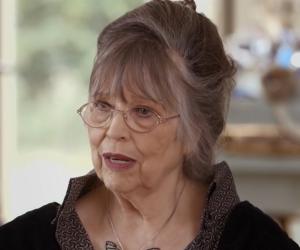Christiane Kubrick made her acting debut as one of the main casts of the German television movie ‘Das Lächeln der Gioconda’ in 1953. While she was credited as “Christiane Harlan” for her debut role, she subsequently went by the name “Susanne Christian” starting with her 1955 West German musical comedy film ‘Liebe ist ja nur ein Märchen’ (Love Is Just a Fairytale). Two years later, she acted in supporting roles in several made-for-television German movies including the music-themed movie ‘Der Schallplattendieb’, the crime comedy ‘Die Schwestern’, and the comedy film ‘Die Abenteuer des braven Soldaten Schwejk’. Also in 1957, she was a supporting cast in the East German operetta film ‘Mazurka der Liebe’, directed by Hans Müller, and the Austrian drama film ‘Mit Rosen fängt die Liebe’ an (Love begins with roses), directed by Peter Hamel.
Christiane Kubrick’s most memorable performance of her entire acting career, which gave her international attention, came in the American anti-war film ‘Paths of Glory’, directed by her future husband Stanley Kubrick. She was cast in the role of a captive young German woman who sang the German folk song ‘Ein treuer Husar’ (The Faithful Hussar) and slowly won the hearts of a tavern full of rowdy and disillusioned French soldiers in the famous final scene of the movie. While she gave up acting in favor of painting after her marriage to the celebrated director in 1958, she has not only made several paintings featured in her husband’s movies ‘A Clockwork Orange’ (1971) and ‘Eyes Wide Shut’ (1999), but also had an uncredited appearance as a woman sitting behind Dr. Harford at Café Sonata in the latter film.
Since her husband’s death in 1999, Christiane Kubrick has appeared as herself in many documentaries about him, including a full part in ‘Stanley Kubrick: A Life in Pictures’ (2001), directed by her brother and Stanley Kubrick’s longtime assistant Jan Harlan. In 2002, she made an appearance on the mockumentary “Opération lune”, also known as “Dark Side of the Moon”, from the series ‘Les mercredis de l'histoire’, which attempted to “expose” how Stanley Kubrick faked the 1969 moon landing.








